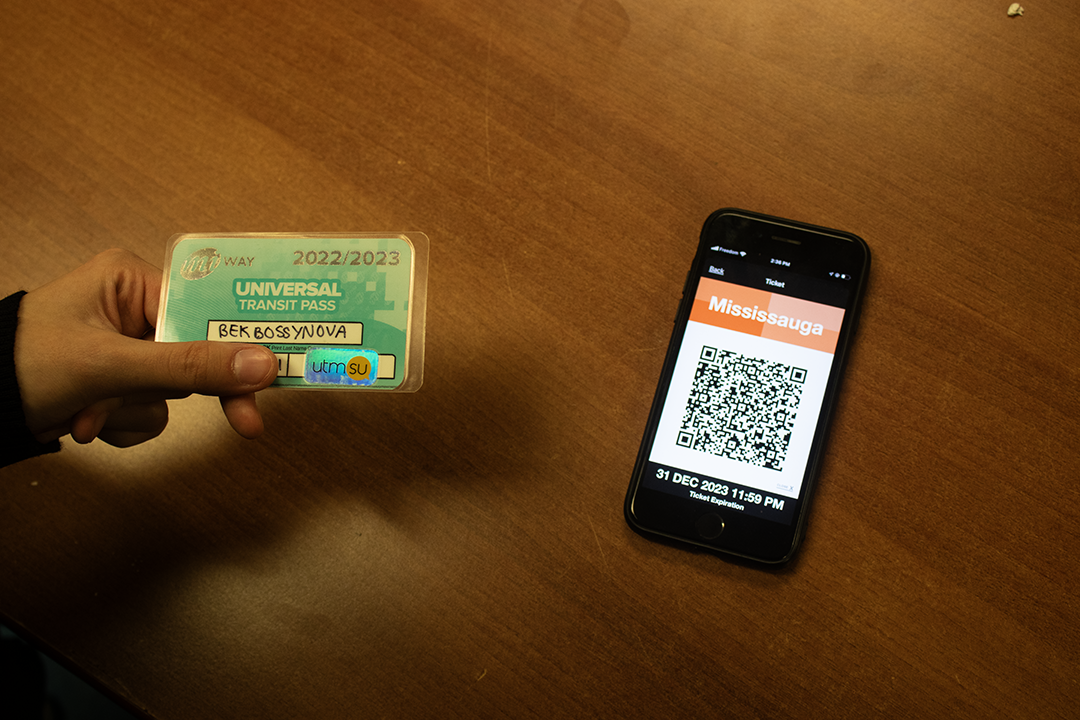During the summer semester, the University of Toronto Mississauga Students’ Union (UTMSU) piloted a digital version of its Universal Transit Pass (U-Pass) — a bus pass strictly for UTM students who use the MiWay transit system.
Currently, students cannot replace the digital pass with the physical U-Pass card. The shift to a digital U-Pass system at UTM has sparked anxieties over phone battery life, scanning difficulties, and pass recognition when boarding public transit.
The UTMSU decided to introduce the digital U-Pass after gathering feedback from over 200 students and speaking with MiWay policy makers about concerns such as replacement fees. If a student lost their physical U-Pass card, MiWay would charge them a $130 replacement fee.
Students can now access the new U-Pass through the PRESTO app and tap their phones on card readers instead of showing the pass to bus drivers, eliminating the need to carry a physical card.
Downsides: Battery life worries and scanning woes
In interviews with The Varsity, students discussed issues with the digital U-Pass, including scanning difficulties, phone battery drain, and the lack of a backup option.
Tanisha Batra, a master’s student pursuing a degree in management of innovation, told The Varsity that she worries about her phone running out of battery and upending her commute. She mentioned having to find ways to charge her phone on campus.
Some students reported difficulties getting their smartphones to register on PRESTO machines consistently, leading to delays and frustrations during their commutes.
Mckayla D’Souza — a third-year student studying biology for health sciences and chemistry — noted feeling a degree of anxiety when they boarded a bus because they didn’t know if the digital U-Pass would scan correctly. D’Souza mentioned taking precautions such as maximizing screen brightness and ensuring their data was on.
Jeanna Gabriel — a second-year student majoring in anthropology with minors in forensics and biology — said in an interview with The Varsity, “Scanning takes way too long, especially [like], some people just don’t know how to scan it.”
Hana Tran — a third-year student pursuing a degree in biology for health sciences and chemistry — also criticized the scanning process for being too time-consuming. “It’s definitely made [the commute] longer because we have to wait, especially when we’re at school — we have to wait so long just to get on the bus because everyone’s trying to scan the U-Pass.”
What’s next?
Gulfy Bekbolatova, the UTMSU president, wrote in a statement to The Varsity that MiWay, the U-Pass service provider, initiated the transition to using a digital pass without consulting the union.
When the UTMSU first announced the change in January, Maëlis Barre, the 2022–2023 UTMSU president, originally described the move as the union’s decision. In another statement to The Varsity, however, Bekbolatova explained that though the UTMSU signed an agreement about making the UPass digital, MiWay ultimately made that decision without the union.
The UTMSU plans to conduct surveys and in-field audits to assess the UTM student experience on MiWay transit.
To support these goals, the UTMSU’s president and vice-president external are in the process of establishing a U-Pass Committee. This committee will serve as a platform for dedicated UTM students passionate about advocating for improved service. Its role will include participating actively in public meetings, such as those from the Transit Advisory Committee, and engaging in research data collection to better understand the specific needs and concerns of UTM students regarding transit.
TransparentUTMSU — a group of student volunteers wanting to promote transparency within UTM — has started a petition to preserve the option of a physical U-Pass. It presently has more than 80 signatures. On the petition site, the group states, “Students should be able to use a pass that they pay for,” with the intent to advocate for MiWay and the UTMSU to offer students the option to select either a physical U-Pass or a digital one based on their preference. UTM students pay a mandatory U-Pass levy fee of $157.77 per session.
In the statement to The Varsity, Bekbolatova wrote that MiWay’s protocol requires bus operators to allow UTM students to board regardless of U-Pass scanning results. If the QR scan doesn’t work, the operator should ask to verify the U-Pass’ expiration date and dynamic QR code. If a bus operator doesn’t follow this protocol, students should report the incident to the UTMSU.



No comments to display.